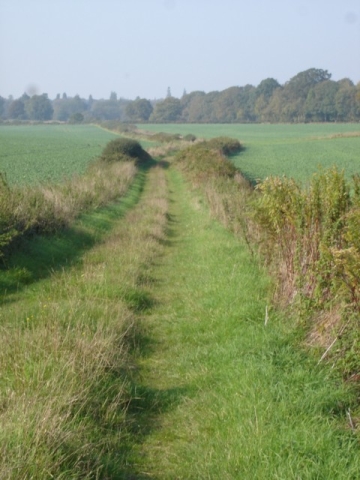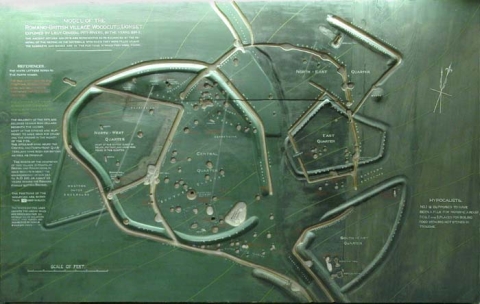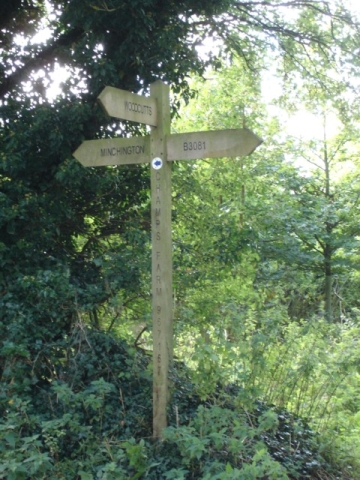Our home from 1988 to 2006
Woodcutts is a small hamlet to the west of Sixpenny Handley.
Just to the north of the hamlet lies
a Romano British Settlement that was excavated during the 1880's by Pitt-Rivers.

The Salisbury and South Wilts museum, in The Close, Salisbury, has an extensive gallery and collection of Pitt-Rivers work and artefacts and the picture below of a model that he produced of the Woodcutts settlement
is reproduced from their
web site.

Photo © Copyright Salisbury and South Wiltshire Museum
Photo by Toby Cullen
For readers of The Downsman, however, Woodcutts has another claim to fame - it is the home of Ted Cox.
Since October 1999, Ted has contributed more than 40 articles about the area around his home, hardly missing an issue.
Both funny and evocative, they show Ted's love of the environment and the people around him, in an area of the country that he describes as his "Paradise".

To enjoy these essays, you can follow this link to The Downsman web sitemap and look for his articles about Woodcutts, but, to give you a flavour, below is his very first contribution which describes his and his wife Madge's thoughts after having moved into Woodcutts the previous year.
Photo by Toby Cullen
Beyond The Noise of Busy Man
We came from south of the Roman road. Fifteen miles south, where the hustle and bustle of the late twentieth century exists. People, numerous people of all sizes, shapes and ages; the majority in later life, residents or grockles (holiday makers); they are everywhere, their cars, buses, vans, lorries, taxis, motor bikes creating noise and exhaust fumes. All extremely busy, goodness knows to what purpose; even the grockles rushing to cram more into their days.
So what have we found here? Here being a "rural suburb" of Handley, Woodcutts. Not the urbanised area of Woodcutts on the main Handley/Shaftesbury road, linking Handley to its neighbouring metropolis Tollard Royal, where traffic uses two lanes separated by a white line on this busy thoroughfare, boasting regularly placed signposts at its periphery. No, we are two fields to the south, down the lane past the Manor, where ancient Britons built a settlement a "few" years ago and the church, a Priory betwixt then and now.
The ancient Britons had no need of a two lane highway and nor do we. A simple, single track with a natural green line down the middle suffices. Despite the narrowness of our arterial system, there are no traffic problems here, even during the rush hour, or more correctly two rush hours, starting at 8.00a.m. and lasting until 10.00a.m. (We have had to extend the period to two hours in order to cope with all the traffic).
What could be a problem stems from the fact that there is only one way in which is also the way out. To go too far could mean falling off the edge, so all drivers turn within a few yards, (not metres, we're not sure if metrication has reached here yet), of our gate and leave by the way they came.
Rush hour traffic includes the postman, paperman, milkman, Jock's home help, Caroline, Graham (both off to work), Mary driving to the village, Terry, to playschool with her Mum, Charlotte, the dustbin lorry each Tuesday, Thursday, Win and her wheelbarrow, the occasional tractor, Pam Wood on her pastoral duties and others who remain nameless because they have not reported in.
Despite all this activity, this wonderful place takes me back some twenty years (this sounds better than fifty) when, as a boy, living over the border in rural Hampshire, I enjoyed a country boyhood. Then people stopped to chat, they walked, gardened, swapped gossip, stories, vegetables, flowers, plants, ideas, information and above all goodwill; very much as this little community does now.
Wandering down the lane at 6.30a.m. with a mug of steaming tea in my hand I will meet old Jock, the retired shepherd with his new pup, Amy. Since he lives alone apart from Amy and his television, he loves a chat. More often than not about the farms and the sheep of his past life. The first time I met him, although I knew who he was, he had no idea who I was and seeing me with my tea rather flummoxed him and his greeting was, "Where did you get that?"
Jock's neighbour of many years, Win, has lived in tier cottages all her life, as her father did before her. He was the foreman woodsman on the estate, with some sixteen men under his control. If there is anything you need to know ask Win, she knows the place backwards, all the field names, the tracks and pathways, the houses and their occupants, now and for the past seventy odd years. She is also a great cricket lover and reels off the names of all the stars since the war. In fact, not long ago she wrote to the selectors complaining of their inadequacies in selecting the team.
Win is a remarkable lady, a widow living alone with a remarkable garden, huge by modern standards, but immaculate. Flowers, fruit and vegetables grow in abundance. The surplus of which she shares with all. Working until dark each fine evening, she has no television and still has time to chat over the hedge to passers by. I suggested that she should have a miner's helmet with a lamp to extend her working hours. (If anyone has such a thing please remember Win)
So you see, early in the morning or late in the evening there is someone to chat to and during the day, if it is fine and she is home from playschool, Terry, our youngest inhabitant, is only too pleased to natter. In her case its not over the garden fence but through it. If some of her reasoning and vocabulary are not clear her lively enthusiasm more than makes up for it.
This is our Paradise, perhaps not everyone's idea of Utopia, but ours, and we thank God for it.